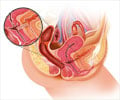Nearly 18 percent of hysterectomies that were done for benign indications were unnecessary. Women undergoing hysterectomy underused alternatives to hysterectomy.

Researchers found that although the numbers of hysterectomies are decreasing, nearly 18 percent of hysterectomies that were done for benign indications were unnecessary, and a pathology analysis for nearly two in five (38 %) of women under 40 did not support undergoing a hysterectomy.
"Over the past decade, there has been a substantial decline in the number of hysterectomies performed annually in the United States," says senior author Daniel M. Morgan, associate professor in the Department of Obstetrics and Gynecology at the U-M Medical School.
An earlier study found a 36.4% decrease in number of hysterectomies performed in the U.S. in 2010 compared to 2002.
Despite the decrease in numbers of hysterectomies in the U.S., appropriateness of hysterectomy is still an area of concern and it continues to be a target for quality improvement.
More than 400,000 hysterectomies are performed in the U.S. each year. About 68% of surgeries for benign conditions are done because of abnormal uterine bleeding, uterine leiomyomata (fibroids), and endometriosis.
Source-Medindia
 MEDINDIA
MEDINDIA




 Email
Email










